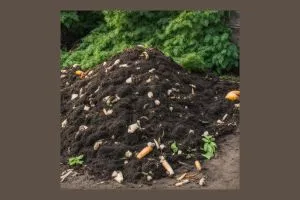- 5 Simple Tricks to Eliminate Maggots From Pet Waste - October 24, 2023
- Keep Your Outdoor Compost Piles Maggot-Free - October 24, 2023
- How to Get Rid of Maggots – Methods that Work - August 30, 2023
I’ve discovered the secret to keeping my outdoor compost piles maggot-free, and I’m excited to share it with you. No one wants to deal with those pesky bugs when trying to compost.
In this article, I’ll explain the causes of maggot infestation in compost piles and provide effective techniques for preventing them. From natural remedies to maintenance tips, you’ll have everything you need to keep your compost free from maggots.
Let’s dive in and keep those unwelcome pests away!
Why do maggots appear in compost bins?
I’ve learned that understanding the causes of maggots in outdoor compost piles is crucial for effective prevention.
Maggots, the larvae of flies, are attracted to decomposing organic matter, which is abundant in compost piles. To control maggot populations, it’s essential to comprehend their life cycle.
Maggots undergo several stages of development, starting from eggs laid by adult flies. These eggs hatch into small, white fly larvae that feed on the decaying. As they grow, maggots molt several times until they reach their final stage. Once fully developed, they pupate and transform into adult flies.
The black soldier fly larvae can be a common source of maggots. Black soldier flies are often used in farming to produce animal feed, but are also useful in the creation of compost. They are good at breaking down animal waste and can be found in North America and Europe.
To prevent maggots, it’s important to maintain the right balance of carbon and nitrogen materials in the compost bin, avoid adding meat or dairy products, and kitchen food scraps, and turn the pile regularly to promote decomposition. Additionally, covering the pile with a breathable material can help deter flies from laying eggs.

Maggot Infestation and food waste
To effectively prevent maggots in compost piles, it’s important to identify the causes and address them accordingly.
One common cause is the presence of meat or dairy products in the compost. Food sources attract flies, which then lay their eggs in the pile, leading to maggots.
Another cause can be an imbalance in the compost bin’s moisture and aeration levels. If the pile becomes too wet or lacks proper airflow, it creates an ideal environment for maggots to thrive.
Additionally, not turning the compost regularly can contribute to maggots. Turning the pile helps distribute heat, break down organic material, and discourage maggots from settling in.
Effective Ways to Prevent Maggots in Compost
To keep maggots out of your outdoor compost piles, I recommend implementing a few effective techniques.
The first technique is to turn and aerate your compost bin regularly. This helps to create a well-balanced environment that’s less attractive to maggots.
Additionally, make sure to keep your compost moist but not too wet. Maggots thrive in overly moist conditions, so maintaining the right moisture level is crucial.
Another technique is to cover your compost pile with a layer of straw, leaves, shredded paper or twigs. This acts as a physical barrier, preventing flies from laying their eggs on the compost.
Lastly, consider using alternative composting methods such as vermicomposting or Bokashi the composting process. The methods involve using worms or fermentation to break down organic kitchen scraps, which reduces the chances of maggots in compost.
Natural Remedies
While there are several natural remedies available, one effective way to keep maggots away from your compost pile is by using neem oil. Neem oil is a natural repellent that can be easily obtained from gardening stores or online.
To use neem oil, dilute it with water according to the instructions on the bottle, and then spray it over your compost. The strong smell of neem oil acts as a deterrent for maggots, keeping them away from your compost area.
In addition to neem oil, there are other natural repellents you can consider using, such as diatomaceous earth or vinegar. Regular compost bin maintenance is also essential in preventing maggots. Make sure to turn your pile regularly, keep it moist but not overly wet, and avoid adding any meat or dairy products.
Tips for Maggot-Free Outdoor Compost Piles
I regularly maintain my outdoor compost pile to keep it free from maggots.
To prevent any issues with maggots, it’s important to properly manage your compost buckets.
First, make sure you’re layering your compost materials correctly. Alternate between dry and moist materials, such brown materials as leaves and kitchen waste, to create a balanced environment that discourages maggots in compost.
It’s also crucial to regularly turn and aerate the pile. This helps to break down the materials efficiently and creates an environment that’s less favorable for maggots.
Additionally, monitoring the moisture levels of your compost pile is essential. Maggots thrive in wet conditions, so aim for dry grass and a damp but not overly soggy pile.
Conclusion
In conclusion, by understanding the causes of maggots in compost piles and implementing effective techniques, you can keep your compost pile maggot-free.
Regular maintenance and the use of natural remedies can also help prevent fly larvae from being attracted to your compost.
With these practical tips, you can ensure that your outdoor compost pile remains a healthy and productive environment for the decomposition process without the presence of maggots.
